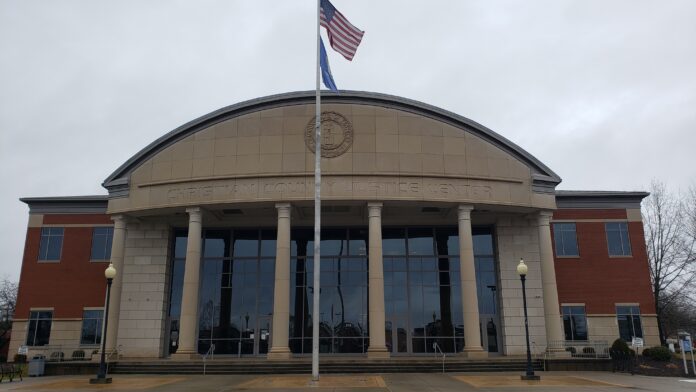MURRAY – In a pleading filed yesterday, WPSD-TV stood by its motion for an award of fees and penalties totaling more than $415,000 filed last month in the civil suit it brought against Murray State University more than a year ago over open records requests, calling such substantial sanctions “necessary” to “send a clear message to MSU that this kind of willful stonewalling is not acceptable from an educational institution in this Commonwealth.”
The reply was filed two days before counsel for the respective parties will appear before Calloway Circuit Special Judge John Atkins for the hearing on the Paducah television station’s motion, which requests $40,428.45 in attorneys’ fees and $374,850 in statutory penalties.
“MSU ignored its obligations under the Act from the beginning,” penned MSU’s lead counsel Michael Abate in yesterday’s filing, “going so far as to invoke the First Amendment to hide from journalists records that documented the University’s attempt to silence its own public radio station; failed to faithfully comply with the basic requirements of the Act following the adverse Attorney General Opinion; dragged this case out for months, only giving up additional information as WPSD and its counsel demanded it; and continued to invoke invalid exemptions even as the records in dispute winnowed down to a final few.
“And as if that weren’t enough, after this Court granted WPSD summary judgment and invited this fee motion, MSU officials issued statements portraying itself as the victim and accusing WPSD (and, by implication, this Court) of unfairly suggesting it did something wrong.”
The statement referenced was signed by MSU Board of Regents Chair Leon Owens and released by the university shortly after the last board meeting on March 1. Quoting the statement, the pleading reads, “The University has taken no actions in willful disregard of the law with respect to WPSD’s requests. As such, WPSD is not entitled to fees and penalties under the Act.”
“(MSU’s) consistent course of conduct evinces a ‘culture of secrecy’ that continues to this day within MSU – i.e., ‘an obvious and misguided belief that the Open Records Act is merely an ideal – a suggestion to be taken when it is convenient and flagrantly disregarded when it is not,’” the reply states. “… Even being mindful that any award will ultimately be born by the taxpayers, this Court should reaffirm that ‘the nominal punishment of an egregious harm to the public’s right to know would come at an even greater price.’”
Atkins entered a summary judgment in favor of WPSD on Feb. 16, adopting the station’s argument that MSU “misused or misapplied” attorney-client privilege and the personal privacy and preliminary records exemptions allowed under the Kentucky Open Records Act in its application of “a near categorical redaction scheme ‘at odds with existing law.’”
The judge ordered MSU to produce unredacted versions of the remaining contested records and also granted the station’s request to file a motion for fees and penalties, which it did 10 days later.
MSU filed its response to the motion two weeks ago and, in it, called the station’s request “gluttonous,” drawing into question both the reasonableness of the fees charged and the way the penalty amount was calculated.
MSU’s response argued that Atkins would be erroneous to award WPSD any fees or penalties because his summary judgment did not include a finding of willfulness, which is requisite to award statutory penalties, and further that such an award would be unjust because the redactions, although ultimately deemed improper, were made in good faith and it “undertook efforts at every juncture” to comply with WPSD’s requests.
But WPSD’s reply contends that MSU’s response “begins from a false premise that the willfulness of its violations of the Open Records Act is still up for debate.”
“This Court already granted WPSD’s motion for summary judgment – which included a request for a finding of willfulness – in full,” the reply states. “And it invited WPSD to submit its motion for fees and penalties. All that is left is for this Court to decide how much those should be.”
Regarding the reasonableness of the fees requested, Abate stated that over the last 10 years, he has “repeatedly” won fee and penalty awards for clients in open records disputes “without a single court ever” reducing his rates or otherwise suggesting his fees were unreasonable.
Citing nearly 20 years of experience in trial and appellate litigation, “including more than a decade of litigating cases under the Open Records Act for individuals, organizations, and media clients across the Commonwealth,” Abate said MSU’s suggestion that his hourly rate of $425 is unreasonable is without merit.
The reply also cites one of MSU co-counsel Suzanne Marino’s cases – Kentucky State University Foundation v. Frankfort Newsmedia, LLC – where the Franklin Circuit Court deemed the $300-per-hour rate she requested as reasonable.
At the time, according to the pleading, Marino had been practicing law “just over two years,” adding WPSD co-counsel Rick Adams’ hourly rate of $290 “easily passes muster under this measuring stick,” given his six years of experience, with his practice largely focused on litigating open records disputes.
“Finally, the suggestion that WPSD’s bills are littered with irrelevant work is plain false,” yesterday’s filing states. “MSU takes issue with counsel reviewing MSU’s many inadequate productions to determine which of MSU’s redactions were improper. This is not a ‘bizarre cyclical framework.’
“Rather, Counsel’s review of MSU’s ever-changing redactions was an integral part of this litigation process, and the repeated back-and-forth proved necessary to slowly whittle away at MSU’s improper redactions. Is MSU seriously suggesting that counsel should not have checked to see whether MSU really did what the law required? This argument should be seen for what it is: more willful behavior from a public agency that refuses to take its open records obligations seriously.”
Out of 135.6 billable hours, MSU’s response specifically called out one time entry on the three-page invoice that was submitted with WPSD’s motion for fees, asserting the entry for two-tenths of an hour for “Research Title IX Due Process Bill and Vote History” was seemingly unrelated to the case. According to yesterday’s filing, that research was, “in fact,” related.
“It pertained to research attempting to establish whether there might be a connection between the University pressuring WKMS (MSU’s NPR-affiliate radio station) to kill stories unflattering to powerful politicians at the same time that many public universities were working to kill (or change) a bill designed to give more rights to students during misconduct investigations,” the reply explains. “Nevertheless, WPSD is willing to voluntarily reduce its original fee request by $58 dollars to remove that entry.”
While WPSD did amend the fee request to down $40,370.45 in the reply, it also requested to submit a supplemental affidavit to capture the time spent by counsel on the matter since filing the original motion for fees on Feb. 26.
“It is clear that MSU remains defiantly committed to its culture of secrecy and coverup,” yesterday’s filing concludes. “Unfortunately, only a serious monetary sanction will signal to the University and its leadership—including the Board of Regents—that something must change.”
When asked for comment on yesterday’s filing, MSU Executive Director of Marketing and Communications Shawn Touney replied that the university does not comment on pending litigation.
Tomorrow’s hearing on WPSD’s motion for attorneys’ fees and statutory penalties is scheduled for 1:30 p.m. at the Christian County Justice Center in Hopkinsville, Kentucky.
Editor’s note: This story was written without input or review from our Board of Directors



